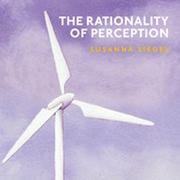
Edgar Pierce Professor of Philosophy Susanna Siegel has published a new book, The Rationality of Perception, with Oxford University Press. The Rationality of Perception makes an important contribution to our understanding of the human mind and, specifically, to how we think of perception. According to a traditional conception of the human mind, reasoning can be rational or irrational, but perception cannot. Perception is simply a source of new information, and cannot be assessed for rationality. Susanna Siegel argues that this conception is wrong. Drawing on examples involving racism, emotion, self-defense law, and scientific theories, The Rationality of Perception makes the case that perception itself can be rational or irrational.
The Rationality of Perception argues that reasoning and perception are often deeply intertwined. When unjustified beliefs, fears, desires, or prejudices influence what we perceive, we face a philosophical problem: is it reasonable to strengthen what one believes, fears, or suspects, on the basis of an experience that was generated, unbeknownst to the perceiver, by those very same beliefs, fears, or suspicions? Siegel argues that it is not reasonable—even though it may seem that way to the perceiver. In these cases, a perceptual experience may itself be irrational, because it is brought about by irrational influences.
Siegel systematically distinguishes a number of different kinds of influences on perception, and builds a theory of how such influences on perception determine what it's rational or irrational to believe. She uses the main conclusions to analyze perceptual manifestations of racism. This book makes vivid the far-reaching consequences of psychological and cultural influences on perception. Its method shows how analytic philosophy, social psychology, history and politics can be mutually illuminating.
More information about the book including a table of contents is available at Oxford University Press.
